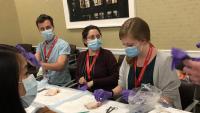Curriculum

Intern Year PGY-1
In the first year of residency, interns are afforded a stimulating educational experience that is centered in providing patient care to all levels of acuity, ranging from ambulatory care to the neonatal intensive care unit (NICU). First-year residents are responsible for admission histories, physical examinations, clinical decision making, inputting orders, and communicating with a multidisciplinary team of care providers. The development of these skills is done within the context of a supervising senior resident who serves as the primary manager of the wards teams alongside hospitalists.
Interns spend one month on the inpatient cardiology service with patients who have a full range of clinical problems from simple to complex cardiac lesions to heart transplant recipients and rhythm disturbances. In addition, first year residents rotate for one month on the inpatient oncology service with exposure to the full range of oncologic conditions. First exposure to ICU-level care occurs during a month in the NICU, whose acuity level is among the highest in the country. Lastly, on the inpatient pediatrics rotation residents take care of general pediatrics patients and patients on the following services: gastroenterology, hepatology, nephrology, pulmonology, pediatric neurology and hematology. Overall, the first year provides a strong foundation for patient care and leadership and prepares the intern for progression to the second year of residency.
PGY-2
The second year of pediatric residency provides residents with the opportunity to consolidate their learning and to assume a greater role as supervisors and teachers of interns and medical students. One of the highlights of the second year is the continued development of diagnostic and management skills. PGY-2 residents learn how to quickly assess and stabilize patients in the emergency room and clinically deteriorating patients on the pediatric wards units. They gain further autonomy during this year in their roles as admitting residents, managing transfers from the pediatric intensive care unit (PICU) to the wards, direct admissions, and emergency department admissions.
Second year residents spend one month in the PICU. Our PICUs have a total of 41 beds, and residents are supervised by pediatric critical care fellows and attendings. This rotation provides an extraordinary opportunity to manage a wide range of critically ill children. Additionally, learning is prioritized, with an emphasis on the pathophysiology of specific disease processes and management. PGY2 residents also further expand their NICU exposure with two month-long rotations. On ambulatory care, residents teach about quality improvement and have dedicated time for legislative advocacy.
PGY-3
By the third year, senior residents take a leadership role as supervisors and teachers. As supervisors, the senior residents have primary responsibility for the daily management of the patients on the wards, in the emergency department, and in the intensive care units.
As team leaders on the inpatient services, senior residents conduct daily patient care rounds with interns, sub-interns, and medical students while directly supervised by physician attendings. Each senior resident spends two months on inpatient ward rotations and is the primary decision-maker for patients on the service with appropriate attending supervision. Senior residents also rotate in the PICU and the pediatric emergency department; they serve as mentors and have a supervisory role for more junior trainees in both of these settings. Night call for senior residents varies from only weekend call to an average of every fourth night on call, depending on the rotation.
Residents consolidate their ambulatory training experience during their senior year. They have ongoing involvement in their ambulatory practices, both in the form of weekly continuity clinic as well as a dedicated month of ambulatory pediatrics. They also assume leadership roles in the small group discussions in their practices, helping the faculty discuss educational initiatives and patient counseling topics.
